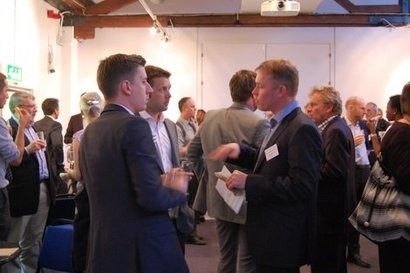
The Localised Energy Landscape: A Thousand Flowers Bloom, held at the University of Bath Innovation Centre on 19th May, featured presentations from five expert speakers on various aspects of community energy followed by a panel discussion on the future for distributed power generation in the UK. The event attracted a capacity audience of experts and professionals in related fields, including those engaged in developing community energy projects across the Southwest.
Presentations were delivered by David Snape, Commercial Manager for Solarsense; Peter Andrews, Associate Director of Communications and Community for Bath & West Community Energy; Peter Skeen, Associate at TLT LLP; Steve Gough, Innovation and Low Carbon Network Engineer for Western Power Distribution (WPD); and Mark Collinson, Energy Sector Specialist for WRAP.
David Snape discussed the recently opened 1.83 MW Moorhouse Solar Farm which is the City of Bristol’s first community owned solar park. This project is the culmination of five years of work by Solarsense in partnership with Low Carbon Gordano. Mr Snape explained some of the issues the project has had to address, including the challenges of developing a site in winter and potential unexploded bombs left over from World War 2.
The Moorhouse Solar Park consists of more than 7,500 solar panels capable of generating enough energy to power 500 homes. Solarsense won the engineering, procurement and construction (EPC) contract ahead of a European contractor because of its experience in developing community-owned projects. The park is owned by its investors, many of them living around Bristol. The park has been operating since April and will reduce CO2 emissions by 850 tonnes per year, generating 250,000 kWh of electricity.
“As European Green Capital 2015, we are delighted to be associated with Low Carbon Gordano's ambitious plan to build Bristol’s first large scale, community owned, solar array – the biggest of its type in the area” said Bristol Mayor George Ferguson, officially launching the Moorhouse Solar Farm on 9th May. “It is a great opportunity for citizens of Bristol and others to invest in our future, with the prospect of a healthy financial return.”

Bristol Mayor George Ferguson opening the Moorhouse Solar Park (Photo: Low Carbon Gordano)
Bath & West Community Energy (BWCE) has been assisting with the development of the Moorhouse Solar Park while also enabling and securing funding for community energy projects in partnerships. Peter Andrews discussed the group’s recent formation of Mongoose Energy to work nationally in localised energy development.
BWCE emerged from the joining together of initiatives conducted by Transition Bath Energy Group and Transition Corsham, the aim being to initiate projects addressing climate change and peak oil while retaining economic value at a local level and offering people a direct say in how their energy is generated and used.
So far, the group has raised nearly £10 million through 7 community share offers and installed 1.7 MW of solar PV representing an annual electricity demand from 500 homes. It is currently developing a further 4.2 MW of solar PV representing an annual electricity demand from 1,200 homes and is working towards financial close on a 5 MW solar PV array which will generate enough energy for 1,450 homes. The group has an overall total of 15 MW of solar PV, hydro and wind energy currently in development.
Peter Skeen of TLT Solicitors explained the financial and legal aspects of establishing local projects, including possible funding options anddifferent mechanisms and structures such as Charitable Interest Companies (CICs) and Community Benefit Societies (BenComs). Mr Skeen also described some of the potential pitfalls in making a project 'bankable'.
TLT has been involved with renewable energy for nearly 20 years, providing advice for a wide range of projects across England, Wales, Scotland and Northern Ireland. The firm is widely known and highly regarded for its experience in wind, solar, hydro, anaerobic digestion, biomass and tidal schemes.
Steve Gough of Western Power Distribution (WPD) discussed issues such as differences in voltages and substation capacities that can make it difficult to connect distributed energy generation projects to the grid. He went on to outline the practical connection process for localised energy and Western Power's three alternative connection options that can streamline the process.
WPD is the electricity distribution network operator for the Midlands, South West and Wales, delivering electricity to over 7.8 million customers over a 55,500 square kilometres service area. It is currently involved in developing projects through Ofgem’s Low Carbon Networks Fund (LCNF) in order to better understand how the electricity network will cope with future low carbon energy infrastructure.
Mark Collinson of the Waste and Resources Action Programme (WRAP) rounded up the presentations by discussing the Rural Community Energy Fund (RCEF) and DECC and Defra’s commitment to assisting community energy projects. Mr Collinson explained how the fund can be used to develop a full project plan, and how groups can maximise their chances of success with an application.
WRAP works with and between governments, businesses and communities to forge partnerships and develop initiatives to help the UK use resources more sustainably.
The event concluded with a panel discussion on the different aspects of the current and future energy landscape, including how energy efficiency measures should work in conjunction with distributed generation, and lessons learnt from Germany’s commitment to community energy projects.
Low Carbon South West works to support the growth of the low carbon and environmental sector in South West England. It works with businesses, universities, local councils and local enterprise partnerships, running frequent events with the aim of building a resilient and diverse network of organisations. The aim of the group is to help promote the South West as a centre of excellence for low carbon development.
For additional information:

